
Related
For the past week, tens of thousands of protesters have filled the streets of Nepal. King Gyanendra has placed severe restrictions on civil liberties since consolidating power in February of 2005. We go to Kathmandu to speak with a Nepali journalist who was beaten by police and we speak with two activists who have been following the latest developments. [includes rush transcript]
For the past week, tens of thousands of protesters have filled the streets of the Nepal’s capital Kathmandu. Nepalese Maoist rebels have united with the seven major parliamentary opposition parties to call for the ouster of King Gyanendra and the restoration of democracy.
Gyanendra has placed severe restrictions on civil liberties since consolidating power in February of 2005. This week’s protests were held despite a government-imposed day-time curfew and shoot-on-sight orders.
On Thursday, senior UN human rights commissioner Louise Arbour, said she was “shocked by the excessive use of force by security forces in Nepal, as well as the extensive use of arbitrary detention.”
On Wednesday, phone service was cut off throughout the country. Vast repression and abuse have been reported, and thousands of Nepalese have fled in fear of further instability.
On Thursday, police fired rubber bullets and tear gas at 70 lawyers who rallied outside the Supreme Court building. UNICEF has cited concerns that children are being injured during protests, many of them at the hands of police. Overall, thousands of demonstrators, have been arrested, including more than two dozen reporters who were detained Wednesday. Many of the journalists arrested have reported severe beatings by military and police.
On Thursday, we reached one of these journalists. Akhliesh Tripathi is the editor of E-Kantipur, an online news service in Nepal. Tripathi began by describing what happened to him a few days ago.
- Akhliesh Tripathi, editor of E-Kantipur , an online news service in Nepal.
For more on the latest in Nepal we are joined by two guests:
- Ashok Gurung, originally from Nepal, Ashok has returned to the country frequently as an NGO consultant. He is currently the Director of the India China Institute at New School University in New York and specializes in international development management.
- Mary Des Chenes, an anthropologist and human rights activist who has worked in Nepal over the past 20 years. She is editor of the Kathmandu-based journal “Studies in Nepali History and Society.”
Transcript
AMY GOODMAN: Many of the journalists arrested have reported severe beatings by military and police. On Thursday, we reached one of these journalists. Akhliesh Tripathi is the editor of E-Kantipur, an online news service in Nepal. Tripathi began by describing what happened to him a few days ago.
AKHLIESH TRIPATHI: I and some of our colleagues, we had gone to cover a protest demonstration in Kathmandu at around 4:30 p.m. two days ago. And then, when we reached the clash site, we saw like there were some 300 policemen. They were clashing with protesters who were in thousands, nearly, let’s say, 10,000 or so. So, when we reached there, we saw that the policemen were charging the protesters, firing bullets, tear gas cells, or charging them with batons, and the protesters in turn were throwing and hurling stones.
And then, like, some policemen, they saw us and they asked us, “Who are you? Who are you guys?” And we told them, “We are not protesters, we are journalists.” And we also showed them our identity cards. But they wouldn’t listen. And all of a sudden, they started beating us. “Go away from here! Go away from here! You journalists, you take photos of we beating them, but you don’t take photos of they throwing stones at us.” And I said, “No, come on. We don’t do anything like that. We report what we see.” And then, like, they wouldn’t listen to us. They started beating us. And there was some inspector or police standing by. We also asked him for help. And then, he said, “Beat them! Hit them, but not on the head.” That’s his exact words. And then, we were beaten up, like they broke some [inaudible] sticks over our backs, limbs and legs. And they broke two sticks on my back.
AMY GOODMAN: How important is it to have journalists at these protests?
AKHLIESH TRIPATHI: It is very important, because if there are no journalists, then there is hardly anybody who is monitoring and disseminating the information more effectively, what is actually happening, and what are the protesters or the police doing to each other, and are the demonstrations, are the protests peaceful or they are violent. It’s really important.
AMY GOODMAN: And are the protests — do you see the protests continuing with the king coming back from his vacation into Nepal?
AKHLIESH TRIPATHI: Well, as I told earlier, the protests were comparatively peaceful today. And there are some positive developments, like the night curfew has been lifted, the mobile phone services have resumed. But these things are being perceived as the general motives, these are cosmetic works done to hide the real ugly face.
AMY GOODMAN: After being beaten, are you going to continue to report?
AKHLIESH TRIPATHI: Definitely.
AMY GOODMAN: Are you afraid?
AKHLIESH TRIPATHI: No.
AMY GOODMAN: Why not?
AKHLIESH TRIPATHI: I’m not afraid, simply because I believe that what I am doing is for the sake of the country, to inform the people, and that’s my job. Reporting is my job.
AMY GOODMAN: Nepali journalist Akhliesh Tripathi. He is editor of E-Kantipur, an online news service in Nepal, speaking to us from Kathmandu. For more on the latest and a history of this conflict in Nepal, we’re joined in our Firehouse studio by Ashok Gurung. He is originally from Nepal. He has returned to this country, to Nepal, frequently as an N.G.O. consultant. He’s currently director of the India China Institute at New School University here in New York, specializing in international development. In a studio in St. Louis, we are joined by Mary Des Chenes, an anthropologist and human rights activist who has worked in Nepal over the last 20 years, editor of the Kathmandu-based journal, Studies in Nepali History and Society. And we welcome you both to Democracy Now! Ashok Gurung, let’s begin with you. First, just give us a context, a history. Place Nepal physically for us, geographically.
ASHOK GURUNG: Well, Nepal is located between India and China. It’s a country known for its Himalayas, but for the past ten years, unfortunately, the country has gone through intense conflict, which has escalated, and as a result of that, over 13,000 people have died. And it’s a conflict that brings Maoists, the king and the people at a very, very sad crossroads.
AMY GOODMAN: How did King Gyanendra come to power?
ASHOK GURUNG: Well, King Gyanendra came to power in a rather very unusual situation, where his brother, who was the king whose family was killed, entire family was killed by his son, Prince Dipendra. As a result of that massacre that took place, Gyanendra was thrust into power on an unexpected term since then.
AMY GOODMAN: Is it possible he actually was the one who massacred the family?
ASHOK GURUNG: Well, it’s unlikely that probably is the case, I think. But a lot of people believe that he might have at least some hand or at least known of the situation. But most people, most analysts would believe that he was probably not directly involved.
AMY GOODMAN: And so, he has been now in power for more than a year.
ASHOK GURUNG: Yes.
AMY GOODMAN: And what has led to these latest mass protests?
ASHOK GURUNG: The main reason for the current escalation of violence in Nepal is primarily a result of in February of 2005 — February 1, 2005 — King Gyanendra decided that he can address the problem of the country, and in the disguise of really restoring democracy and accusing the political parties that they have been ineffective, he took over the absolute power. A lot of people might argue that, in effect, what he did was he has established autocratic rule, very, very similar to what one would say military dictatorship, because he is the commander-in-chief of the army. And it’s because of that and his inability to see that the Maoists, although their violent methods have been condemned by everyone, that they need — that the king needs to really work with the Maoists and the political parties who have really been in some ways now aligned together. And the seven political parties and the Maoists now, they are telling that the king has to immediately restore democracy and the power.
Are you alright?
So I think what’s happening right now —
[break]
AMY GOODMAN: As I recover from a little coughing attack, my first spring cold. I’m Amy Goodman. We’re talking about Nepal, and our guest is Ashok Gurung, who is the director of the India China Institute at the New School, and Mary Des Chenes, an anthropologist who joins us from St. Louis. Mary Des Chenes, your analysis of the situation right now?
MARY DES CHENES: Amy, what you’re seeing on the streets at the moment is a revolt against a despot king. You’re seeing a really true mass people’s movement, something that is fairly rare in the world. At issue — and I should say, you’re seeing also a very, very brutal repression of that. This has emerged out of a general strike called by the closest thing people have right now to a chosen representative, which is an alliance of the seven parties that were represented in the last elected government of Nepal, which, I should stress, was thrown out by the king in 2002, not in 2005. So almost the entire rule of King Gyanendra has been a fully autocratic rule with the complete censorship of all forms of democratic polity. And the people are protesting.
AMY GOODMAN: Can you talk about the role of the Maoist rebels?
MARY DES CHENES: The Maoists, as you know, have been engaged in an armed insurgency for the last ten years. A couple of things that should be said, we will constantly hear a figure. It’s now 13,000, in an agent-less mode, have lost their lives in this conflict. Now, by every international and national human rights bodies’ statistics and, in fact, by the Nepali government’s own statistics, the Nepali army and security forces have been responsible for the majority of those deaths, and when you look at civilian deaths, they have been responsible for far more than the Maoists have.
Now, this is not to say that the Maoists are perfect. There is a spectrum in Nepal from intense hatred of them to great devotion to what they are doing. But what you will see in Nepal is that everyone across the political spectrum all the way up to the palace gates understands that the Maoists are a political force among other political forces in the country, and that the way back to peace involves their very serious participation.
The parties, the other parliamentary parties, and the Maoists have come together in the last six months under extremely difficult conditions and signed two accords, formed an alliance and made a clear agenda of a path forward back to political, rather than armed, struggle, barriers to this having been put up by the king and his army and his international backers.
AMY GOODMAN: Can you talk about who the head of the Maoists is?
MARY DES CHENES: The head of the Maoists is someone named Prachanda and also, I would say, Baburam Bhattarai — either five or six main senior leaders. All of them have a very long history in the Nepali Left movement. Something people, I think, are not familiar with is that they were in the parliaments after 1990, when another people’s movement, legalized political parties, created the constitutional monarchy, which is now in abeyance and been violated, and brought a constitution that gave the Nepali people some rights. They were in the parliaments for the first few years. They were part of a party at that time that was the third largest force in the parliament. They went to armed struggle after an army operation against their candidates in a national election in the far west Rolpa area of Nepal in the early 1990s — ’93, ’94, somewhere in there.
AMY GOODMAN: Ashok Gurung, your assessment of the Maoist rebels and the role they play in Nepal right now?
ASHOK GURUNG: Well, Maoists rebels, as Mary said, really they should be seen as a political force, and that has been recognized by almost everyone in Europe, our two big neighbors, India and China, and people of Nepal. The only two groups who have refused to see Maoists as political force, unfortunately, while one is understandable, it’s the king, the second is the American ambassador, who unfortunately is unable to really recognize that fact. And this is very ironical when you really think about this ambassador, appointed by a Republican government here in the U.S. and the same Republican Party when you look back, 1972. Nixon went to China, shook hands with Mao and had the foresight to really recognize the value of engaging China’s Maoists. And when you compare that with the Nepali Maoist situation, which in the recent months, the Maoists and the political parties, seven political parties, have clearly said that the Maoists are willing to be a participant in a multiparty system, and the current ambassador, U.S. ambassador, has failed to really see that as an opportunity and continues to call them terrorists, which is unfortunate.
AMY GOODMAN: That ambassador is?
ASHOK GURUNG: James Moriarty.
AMY GOODMAN: So the Maoists rebels are on the U.S. terrorist list, the State Department terrorist list.
ASHOK GURUNG: Yes.
AMY GOODMAN: And what does that mean?
ASHOK GURUNG: Well, what that means, I think, is it’s rather complicated. It’s very hard to tell why U.S. is unable to see Nepalese Maoists as a political force, rather than — and continues to brand them as terrorists. And what that really means is that gives the king some sense of, I guess, support or a belief that he can continue, because in Nepal, U.S. leverage is huge. U.S. role is huge. And unless and until the U.S. government sends a clear message that the king must see Maoists as a political force and he must immediately restore democracy, it becomes a continuing problem.
AMY GOODMAN: The Bush administration has sent $20 million to Gyanendra?
ASHOK GURUNG: Yes, and that’s, again, very unfortunate. Before the conflict began — and it’s important to mention that unlike in the neighborhood in the region, the U.S. policies were seen favorably by most Nepalese, but since then, instead of supporting the pro-democracy movement, the U.S. government has decided to fund the Nepalese army, which (a) works outside the constitutional mandate for the people of Nepal; instead of that, they are really working to solely restore and maintain the power of the king. So what the U.S. support has done is not only that it has supplied a large number of arms, but it has also given this king this false hope that as long as he agrees with the U.S. on branding Maoists as terrorists, he can continue to hold onto power.
AMY GOODMAN: What about this U.S. delegation led by the Speaker of the House, Dennis Hastert, that was supposed to go to Nepal from India but is canceled now?
ASHOK GURUNG: That’s right.
AMY GOODMAN: What’s the significance of this delegation? Why were they going? What does it mean that they’ve canceled?
ASHOK GURUNG: Well, as far as I can tell you, I think it was an important visit. I wish, you know, it had taken place, but it’s a clear indication that the visit was canceled partly because of what happened last week in Nepal, where the daytime curfews were instituted and people were — police and army were given order to shoot. So, it was clearly deemed as perhaps unsafe for the U.S. delegation to go there. So this, in some ways, is yet again another missed opportunity for U.S. senior leadership to convey to the king in clear terms that the current position that the king is holding onto is not acceptable.
AMY GOODMAN: Professor Gurung, what do you think is going to happen right now?
ASHOK GURUNG: Well, it’s a very difficult situation right now in Nepal. With each passing day, now people are beginning to talk about how it’s not whether king will stay in power; it’s really a matter of time when and at what cost. And my only concern is that the human cost, which can be huge, which can be significant, and it has been indicated in the past week, where four people died and thousands of people have been injured, as your earlier report showed, we are really hoping that U.S. at this point will send a far more clearer message than it has in the past and help reduce the human cost.
AMY GOODMAN: Do you think it should cut off aid — the U.S. should cut off the aid?
ASHOK GURUNG: It should cut off the aid, and most importantly, it really must insist, the king, that he must restore democracy immediately.
AMY GOODMAN: And what about the fact that he said he will hold elections at some point?
ASHOK GURUNG: Well, as you know, the reports have shown and most political parties have commented immediately that (a) there is really no clear timetable; (b) that kind of a proposal is already past the need of the day. The need of the day is not really to talk about an illusive election, which neither can be really done in a way where it would be acceptable to people, nor, you know, it really will have any significance. It’s really futile to talk about. What one must right now really talk about is immediate restoration of democracy in Nepal.
AMY GOODMAN: Do you see more bloodshed?
ASHOK GURUNG: Unfortunately, with what we saw last week, it seems like the king is bent on really sacrificing more lives, which is very unfortunate, and what is really critical here is the Nepalese army. And what I’m really hoping — the Nepalese army, by the way, if you really look at it, is an army consisting of about 90,000 people. From a developing country, one would imagine that they lack training and they lack exposure.
In fact, Nepal is one of the largest contributors to the U.N. peacekeeping mission, and from a soldier to a general, if you have served in the army for over five years, you have had some level of exposure to U.N. peacekeeping operation, which tells you what conflict is all about, why peacekeeping and peace is important. And I’m only hoping that the leaders in the army will look back at their experience, look into their own hearts, and hopefully will have the courage to really say no to the orders that are being given right now. And once the army begins to really recognize that it must serve people, it must not serve a single individual, I am hoping that the human costs, which can be very high, will be reduced.
AMY GOODMAN: Well, I want to thank you very much for being with us, Ashok Gurung, originally from Nepal, currently director of the India China Institute at New School University; and Mary Des Chenes, an anthropologist speaking to us from St. Louis.


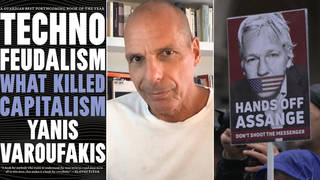
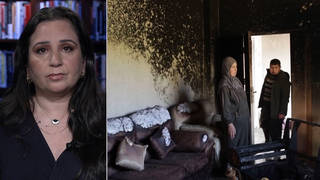
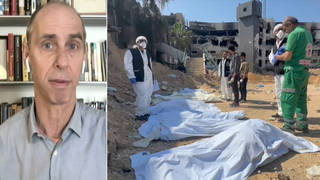





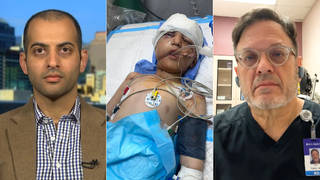
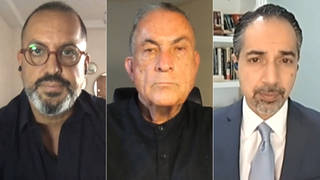
Media Options